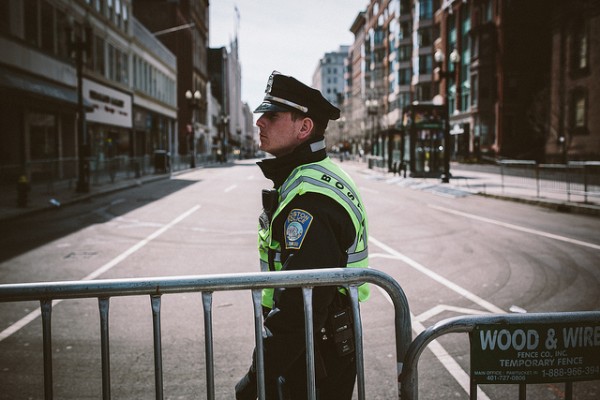
Some rights reserved by Pete Tschudy
I like to write my own blogs, and too often have too much to say to readers who want it short and sweet. But the push to attribute past and future attacks on U.S. citizens on U.S. to “self-radicalization” is the kind of linguistic legerdemain too sweet not to invite more than one response.
The April 23 blog, “Yes It IS Jihad,” by Rachel Ehrenfeld, of the American Center for Democracy, and a second article, a Wall Street Journel oped carried on April 21 — “Yes, It Was Jihad,” by Michael B. Mukasey — fly straight to the heart of the matter — i.e., the all-out push to convince policymakers and the public that the WTC bombing in ’93, 9/11, the Fort Hood shooting (“workplace violence”),the Boston bombings, and whatever comes next are the acts of “non-state actors” or “lone extremists.”
In other words, there simply cannot be any connection between the guys who keep on blowing up Americans and America’s allies in the Middle East.
Mark it up to mental illness, anger, alienation, and the world wide web, which is apparently powerful enough to transform a 19-year-old foreign student who “doesn’t always understand” his American friends into a mass murderer.
Think Manchurian Candidate.
Here’s the thing. Huge amounts of time and money have been paid to U.S. organizations and public affairs outfits in New York and D.C. to create a benign picture of Islam in this country, and many Americans, straining to actualize their own religious beliefs or commitment to peace, have been working hard to “turn the other cheek,” and hold on to the idea that the attacks we’ve been witnessing cannot be the work of a nation or government, or a movement sanctioned by the U.S. government’s official entanglement with extremists it cannot afford to alienate.
We want to believe that these bombings and hijackings are, as the White House suggests, anomalies. The work of otherwise benign young men who stare too long at a webpage, and take it upon themselves, with no encouragement from larger entities, to become that which they behold. 
We do not mention the 1972 decision, described in Rachel Bronson’s “Thicker than Oil,” of our most stalwart Muslim ally, Saudi Arabia, to embrace the most extreme form of Islam by ramping up funding for schools, mosques and other organizations committed to violent jihad, or the failure of the Saudis, until eighteen months after the attacks on New York and D.C., to acknowledge fifteen of the nineteen 9/11 hijackers were Saudi nationals. Or the $10 million check presented shortly after 9/11 to Mayor Giuliani “for the people of New York,” which was accompanied by the presenter’s observation — a Saudi royal — that the U.S. should “reconsider” the policies that “provoke” such attacks. (The people of New York City returned the check.) We do not advertise the fact that al Qaeda, which the administration claims is “neutralized,” is alive and well across five continents and 67 countries. Or that, as New York Times reporter Ben Hubbard has written:
Across Syria, rebel-held areas are dotted with Islamic courts staffed by lawyers and clerics, and by fighting brigades led by extremists. Even the Supreme Military Council, the umbrella rebel organization whose formation the West had hoped would sideline radical groups, is stocked with commanders who want to infuse Islamic law into a future Syrian government.
Nowhere in rebel-controlled Syria is there a secular fighting force to speak of.
The opinions expressed by Ehrenfeld and Mukasey offer us another narrative, and like every good bull in the china shop, they are on a rampage thinking Americans might want to examine.
Make No Mistake, It Is Jihad
by Rachel Ehrenfeld
April 23, 2013Questions such as, “If they don’t like it here why did they stay?” and “why do they want to kill us?” are asked by many Americans. The answer is simple and the Tsarnaev brothers made no secret of it. Their motive is Jihad. They have revealed their motive on Facebook and Twitter. The YouTube videos they’ve reposted make their motive – empathy with Jihad- very clear….Incredibly, with clear evidence of their actions, intentions and affiliation, there are no statements or visible actions to curtail the incitement for Jihad on the Internet, or to name the culprit – Islamism.
Ehrenfeld, having thrown that first brick through the glass window we call political correctness, moves in for another shot:
Had this been a motorcycle gang, or a cult, we would have learned its name by now, and investigative reporters would have been getting journalism awards for exposing a murderous gang. But these days, those who dare to expose Islamists are being cast out for alleged political bias and hate mongering. The inquiry of the Boston “incident” – as referred to by the President – is in danger of obfuscation and manipulation and it’s important for the expert community and the public to pay close attention to the “investigation” as it develops.
Erhenfeld isn’t alone. In a WSJ oped published on April 21, Michael Mukasey—who served as Attorney General of the United States from 2007 to 2009 and as a U.S. district judge for the Southern District of New York from 1988 to 2006–throws out a question a lot of Americans, and certainly the mainstream press, are too often afraid or embarrassed to pose.
Is America Under Attack?
From Mukasey’s oped:
Let’s hope the administration gets over its reluctance to recognize attacks on the U.S. for what they are. If your concern about the threat posed by the Tsarnaev brothers is limited to assuring that they will never be in a position to repeat their grisly acts, rest easy.The elder, Tamerlan-apparently named for the 14th-century Muslim conqueror famous for building pyramids of his victims’ skulls to commemorate his triumphs over infidels-is dead. The younger, Dzhokhar, will stand trial when his wounds heal, in a proceeding where the most likely uncertainty will be the penalty. No doubt there will be some legal swordplay over his interrogation by the FBI’s High-Value Interrogation Group without receiving Miranda warnings. But the only downside for the government in that duel is that his statements may not be used against him at trial. This is not much of a risk when you consider the other available evidence, including photo images of him at the scene of the bombings and his own reported confession to the victim whose car he helped hijack during last week’s terror in Boston.
The Larger Threat
Mukasey isn’t finished,
But if your concern is over the larger threat that inheres in who the Tsarnaev brothers were and are, what they did, and what they represent, then worry-a lot.For starters, you can worry about how the High-Value Interrogation Group, or HIG, will do its work. That unit was finally put in place by the FBI after so-called underwear bomber Umar Farouk Abdulmutallab tried to blow up the airplane in which he was traveling as it flew over Detroit on Christmas Day in 2009 and was advised of his Miranda rights. The CIA interrogation program that might have handled the interview had by then been dismantled by President Obama.
And now, someting I hear from law enforcement insiders over and over again,
At the behest of such Muslim Brotherhood-affiliated groups as the Council on American Islamic Relations and the Islamic Society of North America, and other self-proclaimed spokesmen for American Muslims, the FBI has bowdlerized its training materials to exclude references to militant Islamism. Does this delicacy infect the FBI’s interrogation group as well?
Here’s how authorities should conduct the investigation:
Presumably the investigation into the Boston terror attack will include inquiry into not only the immediate circumstances of the crimes but also who funded Tamerlan Tsarnaev’s months-long sojourn abroad in 2012 and his comfortable life style. Did he have a support network? What training did he, and perhaps his younger brother, receive in the use of weapons? Where did the elder of the two learn to make the suicide vest he reportedly wore? The investigation should include as well a deep dive into Tamerlan’s radicalization, the Islamist references in the brothers’ social media communications, and the jihadist websites they visited.
Mukasey is on a roll, but this point he’s howling into the wind because the answer to the questions below is almost certainly “no.”
Will the investigation probe as well the FBI’s own questioning of Tamerlan two years ago at the behest of an unspecified foreign government, presumably Russia, over his involvement with jihadist websites and other activities? Tamerlan Tsarnaev is the fifth person since 9/11 who has participated in terror attacks after questioning by the FBI. He was preceded by Nidal Hasan; drone casualty Anwar al Awlaki; Abdulhakim Mujahid Muhammad (born Carlos Leon Bledsoe), who murdered an Army recruit in Little Rock in June 2009; and David Coleman Headley, who provided intelligence to the perpetrators of the Mumbai massacre in 2008. That doesn’t count Abdulmutallab, who was the subject of warnings to the CIA that he was a potential terrorist.
And, of course,
If the intelligence yielded by the FBI’s investigation is of value, will that value be compromised when this trial is held, as it almost certainly will be, in a civilian court. . .
The bottom line,
It has been apparent that with al Qaeda unable to mount elaborate attacks like the one it carried out on 9/11, other Islamists have stepped in with smaller and less intricate crimes, but crimes that are nonetheless meant to send a terrorist message. These include Faisal Shahzad, who failed to detonate a device in Times Square in 2010, and would-be subway bomber Najibullah Zazi and his confederates.
And Mukasey gets it right again,
Is this, as former CIA Director Michael Hayden put it, the new normal?
The “T” Word, “Red Lines,” and Other Scary Words
A creative blogger for The Economist, writing on a different topic, recently reached into popular culture and pulled out a truism coined by a Harry Potter character, Professor Dumbledore: “Fear of a name increases fear of the thing itself.”
A notion we muggles might want to examine.
Listen closely as Mukasey comments on that very thing:
There is also cause for concern in the president’s reluctance, soon after the Boston bombing, even to use the “t” word-terrorism-and in his vague musing on Friday about some unspecified agenda of the perpetrators, when by then there was no mystery: the agenda was jihad. For five years we have heard, principally from those who wield executive power, of a claimed need to make fundamental changes in this country, to change the world’s-particularly the Muslim world’s-perception of us, to press “reset” buttons. We have heard not a word from those sources suggesting any need to understand and confront a totalitarian ideology that has existed since at least the founding of the Muslim Brotherhood in the 1920s.
Mukasey tells us there are Muslim groups in the U.S. who speak out against violent Islamic jihad. But no one listens. He also speculates as to why these radical groups, think Jabhat al Nusra, for example, a fighting unit the U.S. supports in Syria, hate us.
The ideology has regarded the United States as its principal adversary since the late 1940s, when a Brotherhood principal, Sayid Qutb, visited this country and was aghast at what he saw as its decadence. The first World Trade Center bombing, in 1993, al Qaeda attacks on American embassies in Kenya and Tanzania in 1998, on the USS Cole in 2000, the 9/11 attacks, and those in the dozen years since-all were fueled by Islamist hatred for the U.S. and its values. There are Muslim organizations in this country, such as the American Islamic Forum for Democracy, headed by Dr. Zuhdi Jasser, that speak out bravely against that totalitarian ideology. They receive no shout-out at presidential speeches; no outreach is extended to them.
The former Attorney General leaves us with an open-ended questions, the kind “hard-reality-seekers” go to the movies and tune into HBO to find:
One of the Tsarnaev brothers is dead; the other might as well be. But if that is the limit of our concern, there will be others.

Consider this: both the U.S. government and the Chechyn rebels next door to Russia have discounted the idea that the Boston bombings were the work of any organized terrorist group — and that’s the kind of consensus that doesn’t come cheap. If the priority is to maintain the political status quo via dissimulation on an international scale, to deny a clear push by extremist groups across the Middle East to impose radical Islamic ideology and rule, then someone, say critics like Mukasey, is getting the job done.
What terrorists? What jihad? What attack?